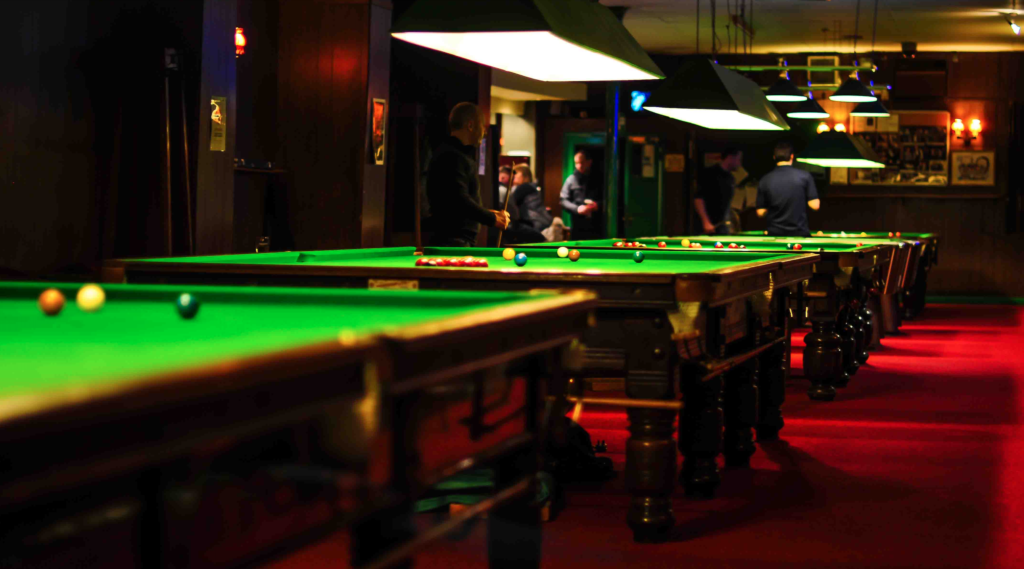It was late winter sometime in the late ‘50s, when the Conversations and comments between Whitey and placards first appeared in the dusty window of the old pool room on 75th Street. They were announcing the appearance of some guy named Joe Batchellor, some trick shot artist from Ridgewood. So, for the next two weeks all the talk in the pool room was about this upcoming trip shot exhibition and the game of straight pool he would be playing with the best player in the Middle Village pool room, our own Sammy Mantel.
I had been going to the rundown place ever since I was 16, which was how old you had to be to get into the pool room (or billiard parlor as they sometimes were called in those days.) Eventually I found out that the poolrooms had rather nefarious reputations with all sorts of unsavory characters who conducted all sorts of unsavory business there, but our pool room was not like that. Oh, there was some gambling on individual games to be sure, but I never saw any of the other stuff and for a couple of years my friends and I practically lived there. Characters though, that was another story, unsavory or otherwise, the pool room had them in full abundance.
The place was owned by an old Italian named Joe Cuomo. Joe was usually upfront by the cash register smoking a Di Napoli cigar. Those cigars were known as “Guinea stinkers,” even by the Italians. They lived up to their name and the pool room was never long without their distinctive aroma. Joe’s place was inhabited by a cast of characters that could be best described as Runyonesque. They were Whitey Dowd and his ever-present pal Willie Fifekey, the original odd couple. Both dressed in shabby sports jackets with shirts buttoned to the top and no ties. An equally shabby fedora topped off the ensemble. Whitey had no visible means of support, with the possible exception of his beleaguered wife who often came to the pool room in search of him.
I don’t know much about Willie Fifekey other than his family had owned a bar / restaurant on 75th Street. In the summer his mother would hang her head out the second story apartment window over where the restaurant had been and scream for Willie to come home for lunch. Now that wasn’t a particularly unusual sight in the New York of the ‘50s, except that Willy Fifekey was about 60 years old at the time.
Conversations between Whitey and Fifekey were often bizarre, bordering on the surreal. No facets of life on earth escaped their off-center spin. I remember my friend Tony Lombardo describing Fifekey telling Whitey about the Eskimo documentary “Nanook of the North,” and he finally had to walk away from them lest they noticed his hysterics. The last thing he heard before he walked out of earshot was, “Those people aren’t civilized, are they Whitey?”
Other regulars spent much of their days there. Seymour the Mailman often came in, mail bag in tow, to while away a few hours. I was glad that I wasn’t on his route, and I pitied the people who were. Another guy known only as Jewel came in almost every night; he only played for money, but in all that time I never saw him win any. Then there was Alan “Duke” Leblang, named after his idol, Duke Snider of the Brooklyn Dodgers. Alan once threw a radio out of his second story apartment window when Jackie Robinson popped up at a crucial moment in the 1950 world series.
All the regulars and a few people I had never seen before packed the old place the night of the match. I was there with my regular crew: Ruby Arabia, Jim Kelly, Leo Haag, Tony Lombardi and Pete Cassese. We all looked forward to the trick shot exhibition of course. But the real attrac- tion was the billiard match that would follow. Everybody figured that Sammy Mantel had a real good chance of beating this guy; he was just that good. He had to be, since, as it appeared to me and my friends. Playing pool for money was how he made his living. He was adept at all the pocket billiard games that were played for money, such as eight ball, nine ball, Chicago and was a master at English billiards, which is played with just three balls on a table with no pockets. He was a quiet man whose face rarely betrayed any emotion. Dressed in a dark suit and the Ban-Lon shirt, usually red, he methodically went about his business which was destroying opponents. Oh yeah, Sammy was going to give this guy Batchellor a run for his money all right, we were sure of it.
Batchellor came in about 8 PM that night; a balding, pleasant-faced man in his early 40s, about the same age as Sammy. He hung up his coat as Joe Cuomo croaked an introduction in that raspy voice, worn down by too many DiNapoli cigars. There was polite applause. Batchellor quickly took his cue stick out of its case, screwed it together, chalked the tip and performed his repertoire of trick shots which were impressive. The crowd applauded enthusiastically after each one. When the trick shot phase of the show was over, and the moment we had all been waiting for had arrived, I looked at Sammy; he didn’t seem nervous at all. In fact, I even saw a rare smile on his lips while he watched some of Batchellor’s outrageous trick shots. This was going to be good!
As preparations were made to start the match the crowd started to quiet down. By the time Joe Batchellor stepped to the table to take the first shot the room was silent. The first shot in pocket billiards is called the “break” and the man who breaks is only required to hit the cue ball hard enough so that one ball or the cue ball hits a rail. This is what Batchellor did, of course, and Sammy was left “safe,” that is, without a clear-cut shot to make. Sammy took a low percentage bank shot and missed. Not to worry, the beginning of a straight pool match consisted of this kind of jacking around until the balls were scattered enough so that the shots became less difficult.
Whether Batchellor made his next shot or Sammy missed, I can’t remember. The game soon reached a point where Batchellor pocketed several balls in succes- sion. Standing on the benches that lined the dark drab walls, my friends and I exchanged wary glances. But then Batchellor missed, and it was Sammy’s turn again. Sammy sank a couple of balls but then, inexplicably, missed a shot that he would normally make in his sleep. There was an audible groan. Sammy’s normally pale face grew ashen as he smiled weakly as Batchellor once again stepped up to the table. The relaxed pro had a run before missing a difficult shot.
The crowd relaxed for a second as a grim-faced Sammy Mantel looked over the table. According to the collective wisdom of everybody in the place, this is going to be Sammy‘s last chance. A pro like Batchellor was only going to give you just so many chances to beat him. Still, the room was not without hope as Sammy bent over the table, called a pocket, and briefly stroked his cue stick. He made the shot. Then he made another and another. Now he was playing like the near legend we had made him out to be.
And so, another small chapter in the mundane lives of Middle Village boys. It seems very trivial today, but it is still deeply etched in the minds of those guys seventy years later. Go figure!
With every ball he sank our hopes rose; it was going to be alright. And then he missed another easy shot. I heard Leo Haag’s breath hiss through his teeth. Kelly closed his eyes; Rudy cleared his throat. It was over. There was no way Sammy was going to win that night.
And, as if it were pre-ordained, we watched Joe Batchellor run off the rest of the rack and then another. The staccato clicks of a ball hitting another ball were the only sounds to be heard in the otherwise silent room. At last, the final ball fell into the pocket, and he was done. The crowd gave him a nice hand. I watched as Sammy came over to shake his hand, that pained smile etched on his face.
We left quickly. I remember the cold March wind was jarring as we stepped outside the stifling pool hall. As we crossed 75th Street. Jim Kelly allowed as how he had nev- er seen Sammy miss easy shots like that. “He choked”, Leo Haag said irritably. But nobody disputed them. Rudy said something about Batchellor being really good. “I’ve seen Sammy shoot just as good,” Tony offered, saying what we all were thinking. Leo said a quick “See you guys,” as he bounded up the stairs to his house. “I really thought Sammy was going to beat this guy,” I muttered to no one in particular as we continued down the deserted street.
We walked the remaining half block to 78th St. in silence. I said so long to the guys, broke from the pack and headed up 78th Street. A cold gust of wind hit me, and I turned up my collar to ward off the chill. The weatherman had forecast sunny and warmer weather for tomorrow. A real spring day! The thought warmed me as I headed home.



